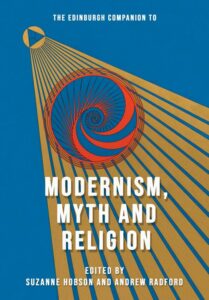
I’m happy to share that my chapter on “William James, Mysticism and the Modernist Epiphany” is now out in The Edinburgh Companion to Modernism, Myth and Religion (ed. Suzanne Hobson and Andrew Radford). It’s an honour to be included here in such terrific company.
As somewhat of an aside: in many ways, this collection represents precisely the kind of scholarship that, when I started my doctoral studies, I felt was largely absent from the modernist field. Thankfully, much has changed since then, and I’m so very grateful to have been able to contribute to this study as well as some of the related conversations about modernism and religion that have been taking place over the past decade or so.
In any case, for those interested, here’s the abstract for my chapter (available in full here: http://www.jstor.org/stable/10.3366/j.ctv32vqkks.20):
William James, Mysticism and the Modernist Epiphany
This chapter contends that the language of religious experience is in many ways indistinguishable from the language of epiphanies so central to literary modernism. Against critics who regard the Romantic epiphany as a secular form of revelation, it posits that modernist epiphanies cannot be fully understood in secular terms; they remind us, instead, of modernism’s religious and Romantic inheritances—two of its many vestigial tails. Indeed, definitions of literary epiphanies supplied by critics and by modernist writers such as Conrad and Joyce are consistently framed using the kinds of mystical and conversion discourse reproduced in William James’s influential study of The Varieties of Religious Experience (1902), even as they register modernism’s documented obsession with the quotidian or the mundane. These correspondences cumulatively highlight not a thoroughgoing project of secularisation, but modernists’ ongoing—albeit highly varied and sometimes unorthodox—commitments to religious imaginaries and ideals. Moreover, the chapter concludes by suggesting that: (1) James’s own articulation of mystical, ineffable experiences without necessary recourse to institutional religious frameworks was actually entangled with literature—specifically, the poetry of William Wordsworth—from the outset; and (2) Varieties, in turn, provided a popular model for modernist and other twentieth-century writers and critics.
Keywords:
William James, epiphanies, modernist literature, mysticism, conversion discourse, ineffability, Romanticism